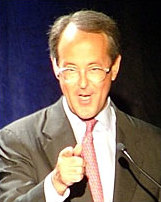Erskine Bowles
Erskine Boyce Bowles (born August 8, 1945 in Greensboro , North Carolina ) is an American businessman and politician from North Carolina. He currently serves as the principal of the University of North Carolina . From 1997 to 1998 he was Chief of Staff of the White House .
Life
The son of the Democratic politician Skipper Bowles spent his childhood in Greensboro. He graduated from the Episcopalian School of Virginia , then went to college. He graduated from the University of North Carolina with a degree in economics. Here he also became a member of the Zeta Psi fraternity. After his military service with the Coast Guard, he enrolled at Columbia Business School, where he completed his MBA and was elected spokesman for the students.
He then worked for the financial consultancy Morgan Stanley in New York. Here he also met his future wife Crandall Close, whom he married in 1972. They have three children together. In 1972 they moved back to North Carolina; Bowles was helping his father, who ran for gubernatorial elections. In 1975, Erskine Bowles was one of the founders of the Bowles Hollowell Conner investment firm. He worked with large companies until the 1990s.
Collaboration with Bill Clinton
As a fundraiser for Bill Clinton's 1992 election campaign , he became increasingly politically important. After the election victory, he was appointed by Clinton to head the advisory board for medium-sized companies. From October 1994 to December 1995 he served as the deputy chief of staff in the White House.
After a brief return to North Carolina, where he co-founded the commercial bank Carousel Capital, Bowles was named chief of staff by Clinton in December 1996. One of his main activities was negotiating the federal budget between the government and Congress. In October 1998 he returned to North Carolina. He was asked by the state governor Jim Hunt if he would like to chair a commission to promote rural economic development.
Application for the Senate
Though he had always turned down political office before, Bowles considered running for the Senate after the September 11, 2001 terrorist attacks . In October 2001 he announced the candidacy as a Democratic candidate. In an attempt to get the vacated seat by Jesse Helms , he was able to win the nomination by his party, but not prevail against the Republican opponent Elizabeth Dole .
In 2004 he made another attempt to get the seat abandoned by John Edwards. In a highly competitive race, he faced Republican Richard Burr and Libertarian Party candidate Tom Bailey . Bowles and Burr's polls plummeted last month. Burr's campaign had focused on attacking Bowles 'ties to the Clinton administration, while Bowles' campaign aimed at Burr's support for trade law reform and the campaign funds he had received. Both camps staked large sums of money, making these campaigns some of the most expensive in the state's history.
Despite an early lead in the post-primary polls and Democrat Mike Easley's candidacy for a second term as governor, Bowles was also defeated on the second attempt. President Bush's easy victory in North Carolina likely helped fellow party Burr a lot. In his speech in Raleigh, the Democratic headquarters, Bowles thanked his supporters after the elections, but indicated that he would no longer run. He quoted his father as saying, "There are many ways to help society," and that political office is just one of them. As a result, in 2005 Bowles accepted an appointment by the United Nations as a deputy envoy for countries affected by tsunamis . Here, too, he worked again for Bill Clinton, who was serving as the UN special envoy.
Since 2005
On October 3, 2005, Bowles was elected to the Board of Directors of the University of North Carolina as Rector, succeeding Molly Corbett Broad. However, some claim that the Board of Directors broke the law by electing them as there were no public hearings during the selection process.
Election results
-
2002: Candidate for the United States Senate
- Elizabeth Dole (R), 54%
- Erskine Bowles (D), 45%
-
2004: Candidate for the United States Senate
- Richard Burr (R), 52%
- Erskine Bowles (D), 47%
- Tom Bailey (Lib.), 1%
literature
- Bill Clinton: My Life. 1st Vintage Books edition. Vintage Books, New York NY 2005, ISBN 1-4000-3003-X .
- Erskine Bowles , in: Internationales Biographisches Archiv 34/2010 from August 24, 2010, in the Munzinger archive ( beginning of article freely available)
| personal data | |
|---|---|
| SURNAME | Bowles, Erskine |
| ALTERNATIVE NAMES | Bowles, Erskine Boyce (full name) |
| BRIEF DESCRIPTION | American businessman and politician |
| DATE OF BIRTH | August 8, 1945 |
| PLACE OF BIRTH | Greensboro , North Carolina |

